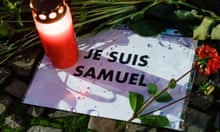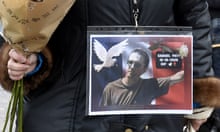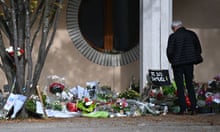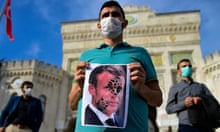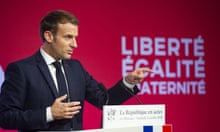The backlash against Emmanuel Macron following his insistence that publication of caricatures of the prophet Muhammad is fundamental to freedom of speech has spread, with angry international protests, cyber-attacks against French websites and warnings that the president’s response is “unwise”.
Muslims in France – and elsewhere – are also furious at what they claim is a heavy-handed government clampdown on their communities in the wake of the killing 11 days ago of the high school teacher Samuel Paty.
The French interior minister, Gérard Darmanin, who has overseen raids on Islamic organisations and individuals in the last week, and even criticised supermarkets over their separate halal and kosher sections, defended the police actions, insisting France was seeking to stamp out extremism.
“We are seeking to fight an ideology, not a religion. I think the great majority of French Muslims are well aware they are the first affected by the ideological drift of radical Islam,” Darmanin told Libération.
In the latest fallout from Macron’s declaration that France would not “renounce the caricatures”, Iran summoned a French diplomat to inform them the response from Paris to the killing was “unwise”.
A report on state TV claimed an official from the Iranian foreign ministry in Tehran had accused France of fostering hatred against Islam under the guise of freedom of expression.
A powerful association of clerics in the Iranian city of Qom also urged the country’s government to condemn Macron’s remarks and called on Islamic nations to impose political and economic sanctions on France. One hardline Iranian newspaper depicted the French president as the devil, portraying him as Satan in a cartoon on its front page.
In Saudi Arabia, the country’s state run press agency quoted an anonymous foreign ministry official saying the kingdom “rejects any attempt to link Islam and terrorism, and denounces the offensive cartoons of the prophet”.
In Bangladesh, an estimated 40,000 people took part in an anti-France rally in the capital, Dhaka, burning an effigy of Macron and calling for a boycott of French products. The rally was organised by Islami Andolan Bangladesh (IAB), one of the country’s largest Islamist parties. There were also calls for the Bangladeshi government to order the French ambassador back to Paris and threats to tear down the French embassy building.
The French satirical weekly, Charlie Hebdo, risked inflaming tensions with Turkey by using a cartoon mocking president Recep Tayyip Erdoğan on the front page of its edition published online on Tuesday night.
“We condemn this most disgusting effort by this publication to spread its cultural racism and hatred,” Erdogan’s top press aide, Fahrettin Altun, tweeted.
In France, Macron’s centrist government is facing criticism over its response to Paty’s killing by Abdoullakh Anzorov, 18, a Chechen national living in France since the age of six, after the teacher showed one of his high school classes a series of caricatures, including one of the prophet Muhammad, during a lesson on free speech.
After his death, French police raided dozens of suspected Islamist groups and individuals accused of extremism. Darmanin said the raids, authorised by a judge, were aimed at “sending a message” and told Libération the searches had uncovered “weapons and videos of decapitations”.
Darmanin has also announced his intention to dissolve high-profile Muslim organisations, including the Collective for the Fight Against Islamophobia in France (CCIF) and BarakaCity, a humanitarian organisation that has carried out projects in Togo, south-east Asia and Pakistan.
Darmanin said the CCIF was implicated in the murder of Paty as a video posted on Facebook implicated it in what he described as a “fatwa” against the history teacher.
“It is an Islamist outfit that does not condemn the attacks … that has invited radical islamists. It is an agency against the republic. It considers there is a state Islamophobia all the while being subsidised (financially) by the French state. And I think it’s time we stopped being naive with these outfits on our territory,” he told Libération.
The minister also defended his criticism of supermarkets that operated special sections for halal or kosher food, saying it led to “communitarianism” and “separation” and declared that the “harassment” of radical Islamism was a “national priority”.
In the wake of Paty’s killing, police sources told French media the authorities were ready to deport 213 foreign nationals on a government watchlist as holding alleged extreme religious beliefs.
There have been calls from several Islamic countries to boycott French goods and protests across the Islamic world, including in Kuwait, Qatar, Iraq, Turkey, the UAE and Gaza.
On Tuesday, Le Figaro reported Islamic hackers had taken over a number of French websites, leaving the message: “Those who mistreat the messenger of Allah must be punished.” Certain groups have called for an “apocalypse” to be brought down on the French web and appealed for other hackers to target French websites. Similar attacks, described by French officials as a “cyberjihad”, happened after the 2015 Charlie Hebdo attack, in which 12 people were killed by Islamist terrorists.
The Muslim advocacy group Cage, a London-based NGO, called on the French government to “end its campaign of hostility towards those carrying out their duties lawfully”.
“The interior minister made the shocking public admission that dozens of individuals not linked to any criminal investigation were raided in order to simply send a message to Muslims in France. This extraordinary claim highlights that the police and other arms of government have been politicised to intimidate otherwise innocent Muslim citizens,” it wrote in an open letter.


